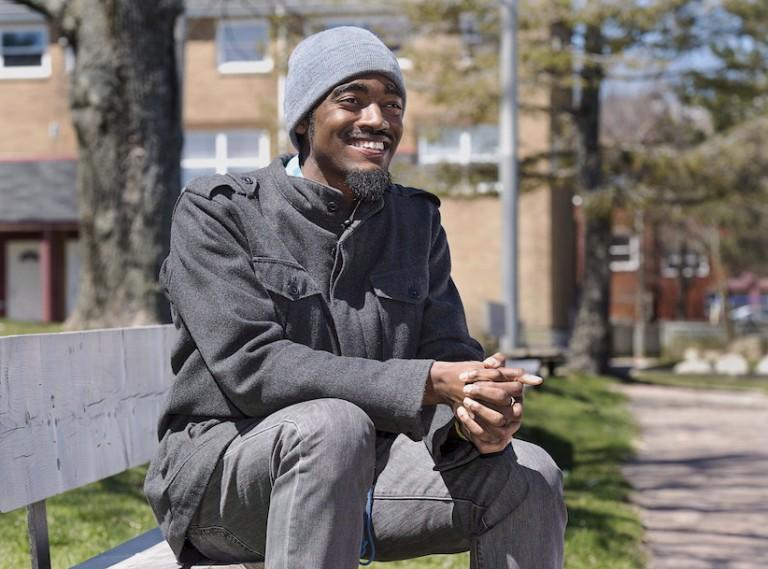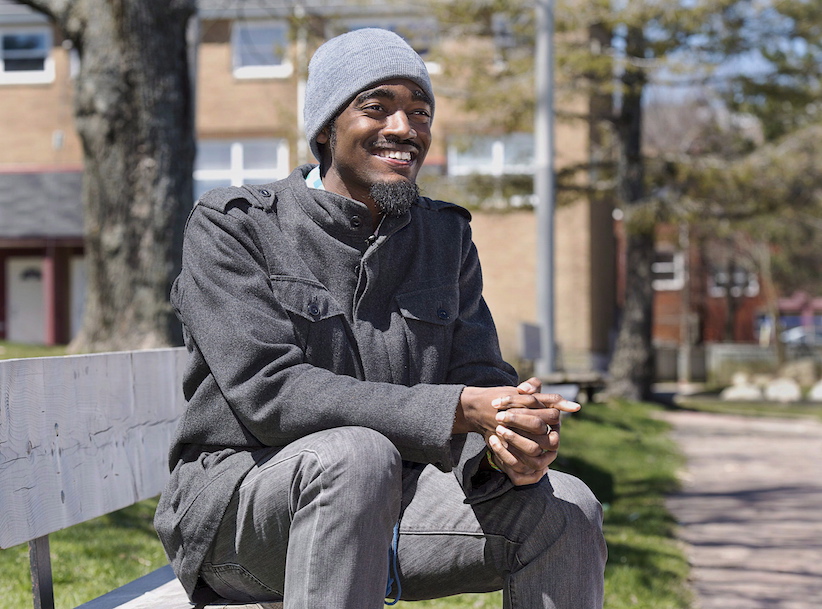Why Lindell Smith’s election in Halifax was so remarkable
It’s not just that a young, black man got elected to Halifax city council for the first time in decades. It’s also how he did it.

Lindell Smith, community activist and political hopeful, is shown in Halifax on Friday, April 29, 2016. (Andrew Vaughan/CP)
Share

Last month, as I was working on a piece about cultural appropriation, a Facebook friend sent me a link to a YouTube video, asking “Have you HEARD about this guy??” I clicked it later that night, and up popped the most unlikely campaign ad I think I’d ever seen. Here was a lanky, bearded Black Haligonian, rocking straight-back cornrows and the type of point-buttoned shirt that gets heavy rotation from church ushers and entry-level interviewees. “I grew up in a community that usually gets portrayed in a negative way,” said Lindell Smith, the young man in the video. “But people in my community supported and encouraged me, so that I wouldn’t become another statistic.” Smith went on to tout his community credentials, his entrepreneurial spirit, and commitment to safe spaces for youth. I’ll admit, my first thought after watching that video was: good luck, bruh.
And then Lindell Smith went on to win the Halifax District 8 council seat in a landslide, making him the city’s first Black person to do so in 20 years.
Recently, whenever Halifax has made national headlines or begun trending on social media, the reasons have been anything but flattering. There was a brief struggle when the Africville Heritage Trust asked city council to decommission Africville Park as an off-leash dog area, and then white dog owners advocated for letting their pets defecate freely on the soil where the descendants of Black loyalists and freedmen watched their community bulldozed by the city.
Then there was the matter of racial profiling and harassment, which extended past police measures and into businesses singling out Black residents as potential criminals. Recently, grocery giant Sobeys was assessed a $21,000 penalty by the Nova Scotia Human Rights commission after a Black customer reported that she was falsely accused of shoplifting. Former Nova Scotia Lieutenant Governor Mayann Francis spoke to the issue publicly, telling CBC “I know the stores where I will be followed. So I do my best to get what I need elsewhere…or if it means that I do without, I do without.”
CANADA’S STORIES: Mayann Francis gives Viola Desmond her due
And yet, when I spoke with Lindell Smith, the historical undercurrent of prejudice has no place in what he sees as the future of a more inclusive Halifax. “A lot of folks feel like they can’t do it,” Smith said, referring to the lack of diverse representation in city council. “And for 16 years … no one seemed to think this was something that needed to happen. When I went public, the conversation seemed to change.” Smith credits his win to a strong and dedicated campaign team, as well as his deep ties to a community where he spent most of his time working on youth-related projects. In addition to his work as a local library assistant, Smith has worked on crime prevention programs, and co-founded Centreline, a non-profit recording studio. Last year, he spoke in front of more than 9,000 youth for WeDay Atlantic, and stressed the importance of youth participation in global issues.
But all of that can be easy to overlook when confronted with Smith’s appearance at the doorstep. There’s Black, and then there’s Black. Non-respectable Black. Known-by-first-name-at-the-rec-centre Black. This is the genuine, non-conforming, and natural Black aesthetic with which Smith is comfortable, and which he kept during the campaign. Looking through his website and news photos, the District 8 councillor-elect did not wear natty suits and oxfords scuffed on the hustings. He is not clean-shaven, and he did not crop his hair down to the Caesar cut ubiquitous to Black men in business and politics. When Smith canvassed for his campaign, he did so in hooded windbreakers and sneakers. He took media photographs in jeans, and a grey peacoat. The tails of his cornrow braids dangle far below his winter toque, and the whiskers of his chin jut out like the bristles of a badger-hair brush.
I asked Smith if that realness of character necessary to do his kind of community work—which is so often confused by the ignorant as markers of Black deviance—hampered him at all during the campaign. He described a moment early on in the campaign, when a member of his core team had some blunt words about the realities of knocking on strangers’ doors: “You’re going to have to deal with people looking at you like you’re Snoop Dogg trying to be a politician.”
Smith took that advice to heart, and made it his first priority to reach residents who weren’t familiar with him, and might be quick to judge. “At the doorsteps early on, we went to the areas in [District 8] that you could describe as predominantly white communities. And we made sure to figure out what their concerns were. I might be a young Black male, but we worked on making them feel confident I was right for this job.”
Smith’s message of responsible community development, in the face of a rapidly expanding and gentrifying downtown core, struck home with residents. On election night, he collected 53 per cent of the vote, and was declared an early winner. “Maybe this proves I wasn’t crazy,” Smith said in his victory speech, to laughter and applause. “Maybe it proves that the community wants to see change.” When I asked him about the media response to his election, some of which highlighted his political inexperience, Smith chuckled and said, “There’s going to be a learning curve [for new councillors], no matter what. I might not have experience as a councillor, I do have that experience as a longtime advocate and a member of the community.”
I have to be honest here—I envy Lindell Smith. I’m envious as a Toronto resident, an unsuccessful candidate for city council, and as a Black businessperson who took elders’ advice to heart. Pull up your pants, cut off those braids, turn off that music in the car if you don’t want to get pulled over. Watching Smith’s campaign grow on social media was encouraging, and his victory speech delivered in a local coffee shop was heartwarming. But the CBC photo he took alongside other rookie councillors, wearing those cornrows and a mottled beige hoodie—the symbolism left me breathless. Whatever direction Smith’s political career takes, the rest of us (myself, especially) can learn something from his story thus far. When the community aligns around representation from leaders who have put in the work, and are willing to see people for who they are, great things will happen. Next time I’ll save the “good luck” for someone who needs it.